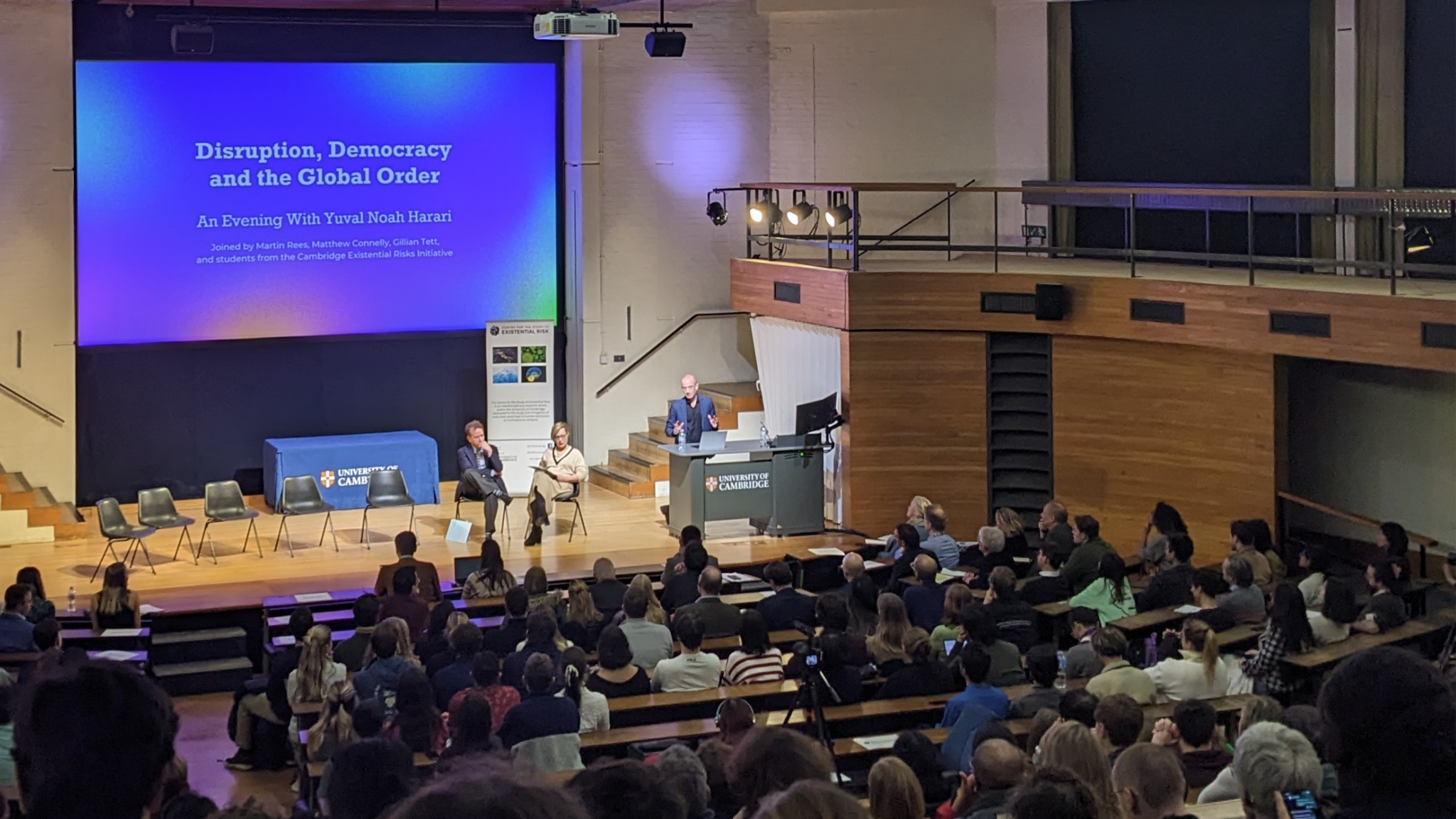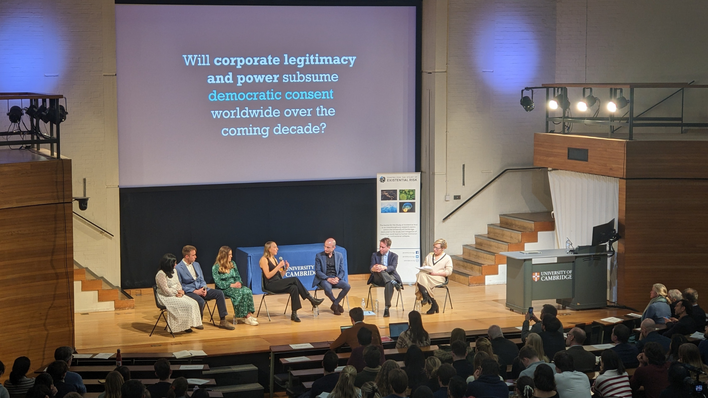CSER and King’s College Cambridge hosted a talk by Professor Yuval Noah Harari on Disruption, Democracy & the Global Order. Yuval is joining CSER as a Research Fellow, the first appointment in the Institute for Technology and Humanity’s Distinguished Fellowship programme.
 Harari was joined by Sir Martin Rees, Professor Matthew Connelly and Dr Gillian Tett, as well as Olivia Benoit, Shoshana Dahdi, Giovanni Mussini and Nandini Shiralkar from the Cambridge Existential Risks Initiative.
Harari was joined by Sir Martin Rees, Professor Matthew Connelly and Dr Gillian Tett, as well as Olivia Benoit, Shoshana Dahdi, Giovanni Mussini and Nandini Shiralkar from the Cambridge Existential Risks Initiative.
Harari’s talk focused on avoiding global war, which he thinks is necessary for providing the resources and wisdom to deal with other existential risks. He said, “the bad news is that the Third World War might have already started, and we just haven’t realised it yet.”
“Here at CSER, scholars focus on the study of existential risk. Two existential questions need to be asked in the context of World War III. One: is it possible to prevent ecological collapse or an AI catastrophe in World War III? To my mind, the answer is obvious – No. If we are in the midst of World War III, we can't invest the necessary resources or secure the necessary global cooperation to prevent ecological collapse or AI apocalypse. Two: If WW3 has already begun, or is about to begin – can we still stop it? Regarding the war in Ukraine, the answer again seems obvious - Yes.”
He argued that neither war nor peace are inevitable. At least for a few more years, there is still the opportunity to avoid re-living powerful narratives from the 20th Century: “among humans, wars are almost never fought over objective needs like food or territory. They're almost always fought about the stories we believe.”
Harari can see a future that does not assume “competition is the inescapable condition of the international system”. He does not believe stories that characterise the world as a jungle where the strong prey on the weak.
“This is a selective view of reality & jungles. Real jungles are full of cooperation, symbiosis & altruism displayed by countless animals, plants, fungi & even bacteria. If organisms in rainforests abandoned cooperation they would quickly die. That’s the real law of the jungle.”
Harari explained, “the superpower of sapiens is the ability to cooperate in larger numbers”. If you as an individual want to make a change, you should work with others, in groups or institutions on a subject close to your heart.

In support, Nandini Shiralkar added she believes if you care about something enough, you can make others care and go to great lengths to solve the issue. Olivia Benoit said that compared to an individual living hundreds of years in the past, we have more agency than humans have ever had which makes the time we live in now unique.
Harari agreed, noting that although we have power, one of the most common narratives even powerful nations and groups tell themselves is the narrative of victimhood. Not only does this narrative rob them of power, but it also takes away any responsibility for the state of the world. Acknowledging you have this power can be scary as it implies you have a responsibility to make a change.
An audience member asked if World War II is taught in schools around the world, what might be taught in schools in 50 years about the various conflicts today? Harari responded by questioning if there will be schools in 50 years. Schools are a consequence of the industrial era and universities are a consequence of the mediaeval era. The printing press & radio can only repeat ideas that have already been created; AI can (perhaps) create new ones.
He added that the AI we are familiar with today is still at a very early stage of its evolution, asking “if ChatGPT is an amoeba, how do you think an AI T. Rex would look like?”
Nandini Shrilkar asked if we need new narratives about AI risks & safety. Harari explained we can't be too focused just on regulation and we can't anticipate all the threats. We need to build living regulatory institutions & build public trust.
Giovanni Mussini asked what stories or narratives we need to become stewards of the planet. Harari said we need new media about the ecological crisis and we need to get from our minds to our bodies - away from the inventions of our minds to being embedded in our bodies. He asked: what can we do to increase moral consideration for all sentient life in studies of existential risk?
Gillian Tett’s three takeaways from Harari's talk were: 1) we live in an era of global risk; 2) we are not powerless - join a group, focus and get to work; 3) keep in mind the power of narratives.